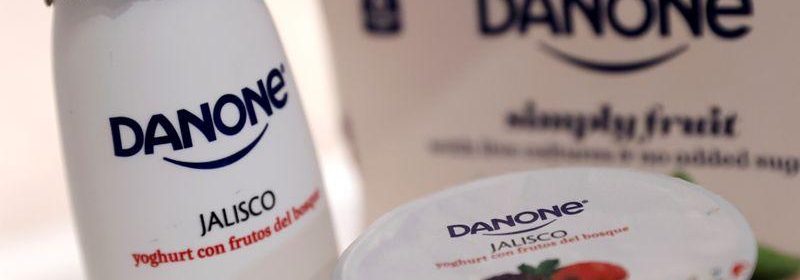Facing activist pressure, Danone warns of tough start to year

PARIS (Reuters) – Danone on Friday said it would return to profitable growth in the second half of 2021 after a tough first quarter, as the Activia yoghurt maker doubled down on a turnaround plan criticised as too slow by some investors.
Chairman and Chief Executive Emmanuel Faber has come under growing pressure as several activist shareholders push for management changes to lift returns, which have lagged those of some rivals even during the COVID-19 pandemic.
Faber acknowledged on Friday that Danone’s share price – which is at seven-year lows – “is not where we would like it to be”, and added that he was open to dialogue with investors.
There was no word on governance changes however, and the group said it would provide more details of its strategy overhaul as it focuses on profitable brands at an investor day on March 25.
Asked whether he would be open to splitting the chairman and CEO roles, which some shareholders have urged, Faber said he was “not dogmatic” on the issue but had no update.
“It might be a topic for the future, but you can’t expect any more comment on that today,” Faber told an analyst conference call, adding that there was huge employee support for the firm’s strategy.
U.S. investment firm Artisan Partners, which said it had built up a stake of over 3% in the Activia yoghurt maker, has urged the company to sell off underperforming brands like its Asia water label Mizone and shake up its governance.
Activist investor Bluebell, which has not disclosed its holding, has called on Faber to step down. The fund on Friday reitered its call for management changes.
Faber, in his seventh year as chief executive, has pursued a strategy centred on diversifying the group’s portfolio into fast-growing products featuring probiotics, protein and plant-based ingredients to mitigate slower growth in dairy.
Danone on Friday said it had agreed to buy U.S. plant-based foods specialist Earth Island in a deal that would help the group reach a target of generating 5 billion euros ($6.1 billion) of plant-based sales worldwide by 2025.
The group’s like-for-like sales fell 1.5% in 2020, which was slightly better than analysts’ estimates in a company-compiled consensus for a 1.6% decline.
The maker of Evian and Badoit bottled water said this reflected a fall in water sales to the restaurant sector during government-enforced lockdowns. Coronavirus travel restrictions in Asia also weighed on sales of infant formula.
SALES GROWTH TO RETURN
It warned that the first quarter would still be tough due to unfavourable comparables, in particular on its Specialised Nutrition operations in China.
But it added that its 2021 recurring operating margin would be broadly in line with the 14% of sales achieved in 2020 and said sales growth would return in the second quarter.
The world’s largest yoghurt maker also said it would slash its 2020 dividend by 8% to 1.94 euros per share, to reflect weaker earnings.
Danone shares were up 2.8% at 0955 GMT.
The 2020 operating margin declined by 150 basis points on a like-for-like basis to 14% of sales, in line with the company’s guidance and analysts’ expectations.
This reflected costs linked to the pandemic and a lower contribution from Specialized Nutrition, Danone’s most profitable business, due to a slowdown in China.
In contrast, Swiss rival Nestle on Thursday posted organic sales growth of 3.6% and an operating margin of 17.7% of sales for 2020.
Bright spots included the Essential Dairy and Plant-based business, which was back to solid 3.4% sales growth in 2020, underpinned by both Essential dairy, with a low single-digit percentange gain, and the Plant-based business, whose sales grew 15% year on year.
(This story corrects share price, paragraph 16)
Source: Read Full Article
